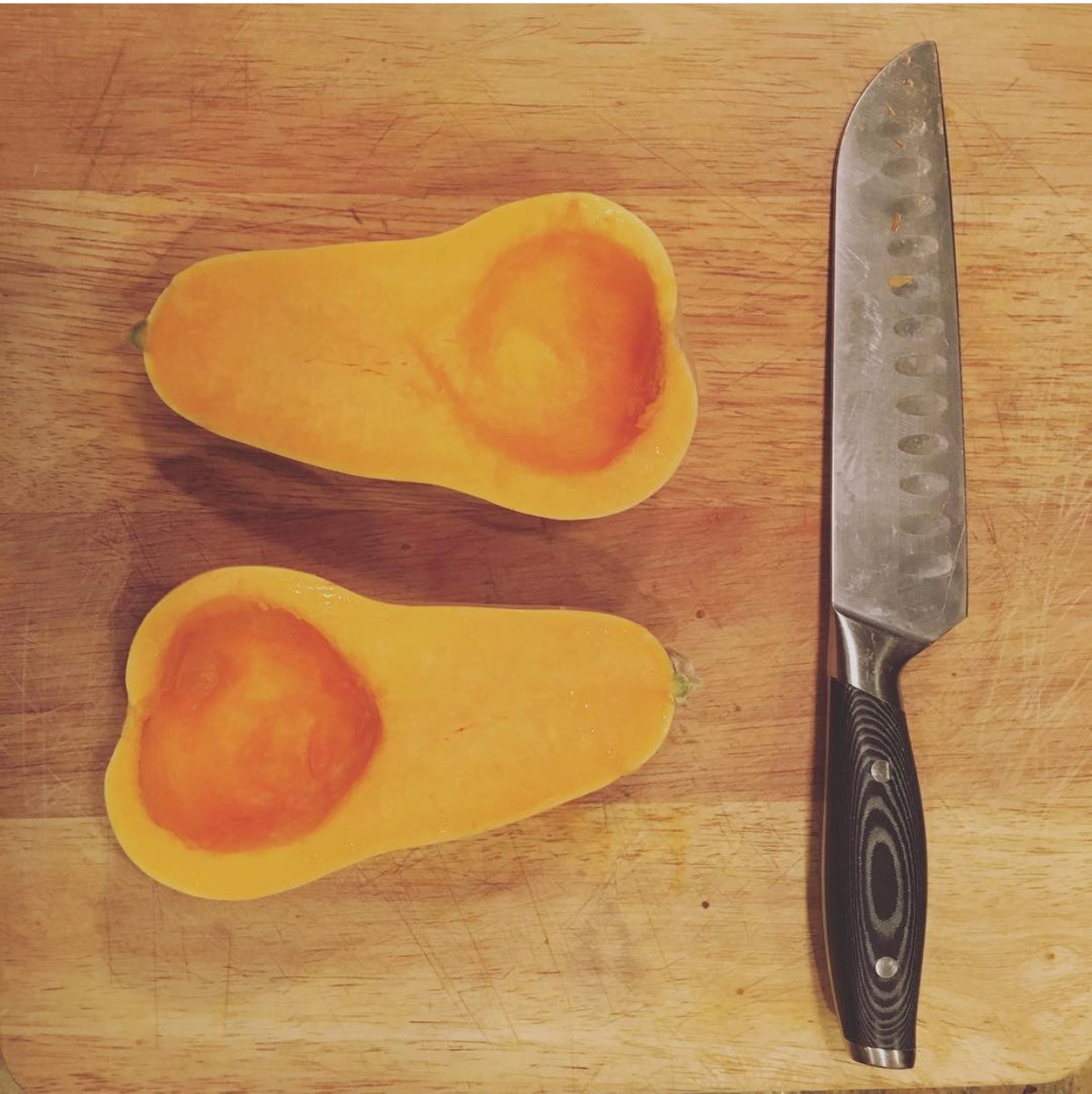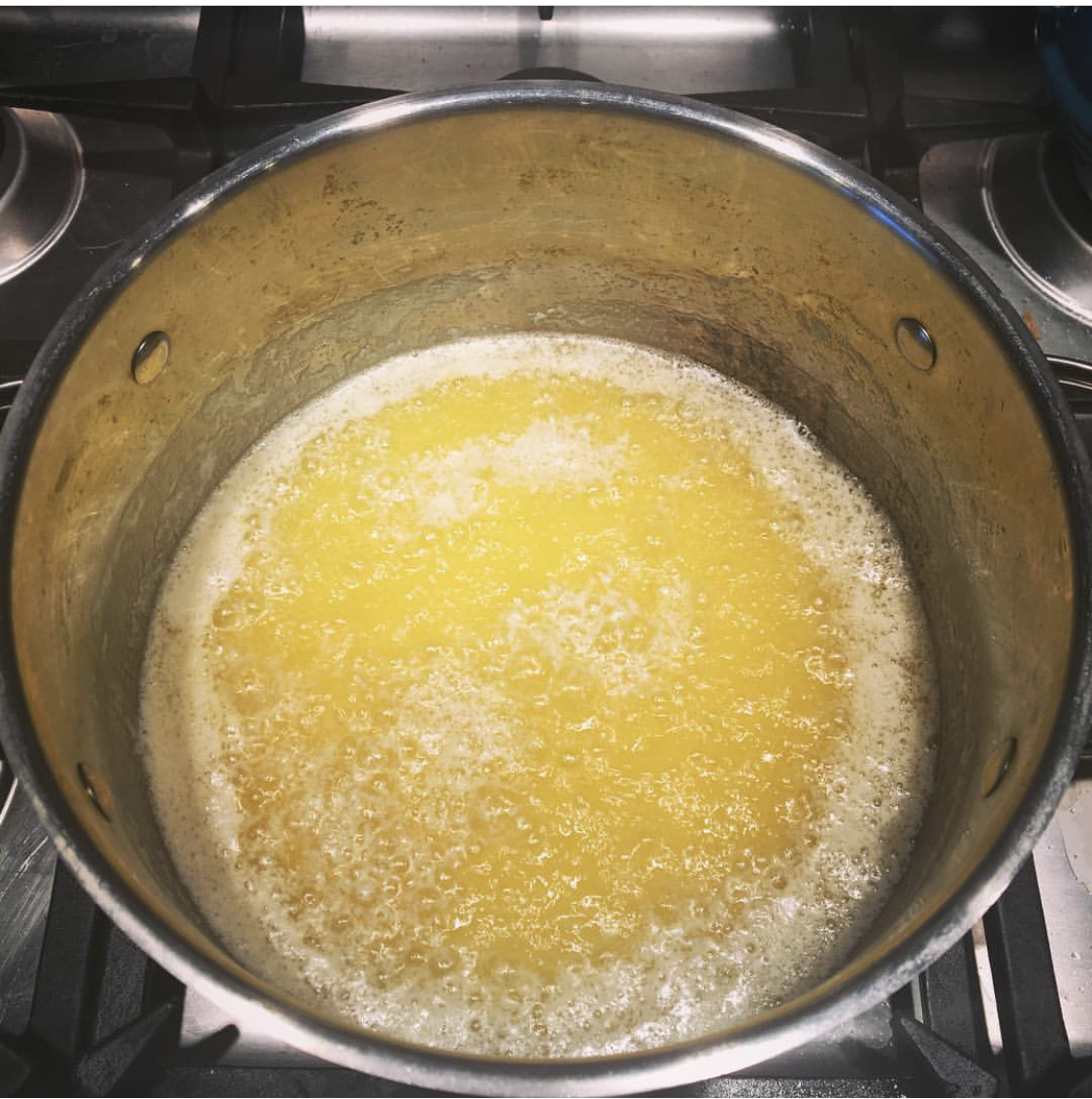
VATA PACIFYING AYURVEDIC BUTTERNUT SQUASH SOUP RECIPE
I have noticed that each year, around the same time, I grow weary of the long, hot, dry summer months and begin to look forward to the cool wind and showers of fall and winter. Not only do I grow tired of the persistent California heat, but also of summer foods like green salad, summer squash, and BBQ. I’m a little embarrassed to admit that last part because I am forever grateful for the bountiful summer gardens and for evenings, spent outdoors firing up the grill. In late summer, however, my heart inevitably begins to yearn for heartier fall vegetables like kale, chard, collard greens, and winter squash. More than once I have caught myself in the kitchen daydreaming about cooking up a hot, nourishing bowl of ayurvedic vegetable soup or stew, all cozy inside with the fire burning and cold rain pouring softly outside.
Now that it’s mid-January, my summer daydreams have become a winter reality. Outside it is cold and wet, while inside, my husband has the wood-burning stove going and I’m preparing to cook hearty and delicious Ayurvedic vegetable soups and stews! Some of my favorites include a faux meatball soup, sweet potato & carrot vegetable soup, and vegetarian chili. Although these sound like quite a few, I feel like I have not been making the most of soup and stew season because I have not made one of my absolute favorite seasonal recipes yet, a vata dosha calming ayurvedic butternut squash soup!
A Soup with a Story
Just to backtrack, I did not grow up cooking. When I was a child, my Mom was not keen on having me in the kitchen to help. I understand her hesitance now that I am older and I am the one cooking the majority of the meals in our home. Like my predominantly pitta Mom, I usually have a game plan in the kitchen and enjoy cooking solo. In my college days, I taught myself the way around the kitchen and really began to cook in my junior year. At that time, I had a job at a local Gainesville, Florida bookstore called Goering’s Books. I worked the late shift from 3-9 pm. This was around 2007 when the Amazon Boom was just beginning to shut down local bookstores left and right. Unfortunately, Goering’s itself was feeling the effects of the e-commerce shift. Most nights were quiet in the bookstore which was not great for business but, on a positive note, it gave me ample time to read and peruse the store shelves.
The cooking section began to draw me in as I pulled many a cookbook from the shelf. I started writing recipes in my Moleskin Notebook and ended up creating my own personal recipe book. I started with a blackberry basil crumble recipe from Barbara Kingsolver’s book, Animal, Vegetable, Miracle. Whew, I am glad I wrote that one down—so good. From there I added a few more of my favorites. The 6th recipe I jotted down was a butternut squash soup from Book Lover’s Cafe Recipe Book by Ian Schleifer. Book Lover’s was a local vegetarian cafe and bookstore I loved to frequent. Their menu was clean, simple and fresh. With just a few ingredients, the butternut squash soup was so easy to make, perfectly suited to a students budget. Today, I still find this soup to be absolutely perfect in every way. I love how it brings me back to the days when I was just learning my way around the kitchen. I love how simple this recipe is and for its vata-pacifying and nourishing properties, making it perfect for those chilly fall and winter days.
DOSHIC QUALITIES OF BUTTERNUT SQUASH
In Ayurveda methodology, fall and winter are considered to be vata season. During this time of year, vata dosha can easily go out of balance due to the colder temperatures settling into the natural world. To counteract the cold, Ayurveda recommends incorporating plenty of root vegetables and winter squash into the diet. The heavy, warming, moist and soft qualities found in vegetables like sweet potatoes, carrots, yams, acorn, and butternut squash help counteract the light, cold, dry and hard qualities of the air and ether elements that make up vata dosha.
If you suffer from dry skin year-round or experience dryness in the fall and winter, it is because vata dosha is increased within your body. An increase in vata can result in things like dry skin and hair, constipation, gas, anxiety, and worry. Enjoying Ayurvedic vegetable recipes like this butternut squash soup will help you maintain your balance of vata dosha. Butternut squash is rich in vitamin C which helps build collagen production and supports the structure of the skin. Vitamin A is also found in butternut squash and it is necessary for sebum production. The ability to produce sebum is essential to maintain hydrated, supple skin.
So, if you are looking for an Ayurvedic squash soup that also helps maintain the health & vitality of your skin, please try this one! This vegetable soup recipe is simple, versatile, full of vitamins and minerals and always pleasing to the palette. If you like it, maybe even add it to your own recipe book.
AYURVEDIC BUTTERNUT SQUASH SOUP RECIPE
-vata, +pitta*, +kapha*
Symbols for how this dish affects the doshas:
“-” means calms & helps balance this dosha
“+” means increases & aggravates this dosha
“0” means neutral effect
*this dish is okay in moderation for pitta & kapha in the winter season
Servings: 10
Prep Time: 30 minutes
Cook Time: 20 minutes
INGREDIENTS
2 tbsp ghee or olive oil
10–20 sprigs fresh thyme, leaves removed
3 ribs celery, chopped
1 medium onion, chopped
¼ cup fresh parsley, minced
1 bay leaf
6 cups water or vegetable broth
1 medium butternut squash, peeled, seeded & cubed
2 cups carrots, chopped
1.5 tbsp PAAVANI Vata Spice Blend
1 tbsp salt (or to taste)
Optional: cream, milk or coconut milk
Optional: pinch of nutmeg
INSTRUCTIONS
1. Prepare the vegetables
Peel and cube the butternut squash. Chop the celery, onion, carrots & parsley. Strip the thyme leaves from their stems.
2. Build the aromatic base
Warm 2 tbsp ghee or olive oil in a large soup pot over medium heat.
Add:
thyme
celery
onion
parsley
Sauté for 10–12 minutes, until the vegetables soften and the aromatics become fragrant.
(This step is what gives the soup its depth of flavor.)
3. Add the vegetables & liquid
Stir in:
butternut squash
carrots
bay leaf
salt
Pour in 6 cups of water or vegetable broth.
Bring to a gentle boil, then reduce heat to low.
4. Simmer until tender
Cover and cook for 20 minutes, or until the squash and carrots are easily pierced with a fork.
5. Blend the soup
Remove the bay leaf.
Allow the soup to cool slightly.
Blend in batches (or use an immersion blender) until smooth and creamy.
6. Add richness
Stir in cream, milk or coconut milk for a silkier texture.
Finish with a pinch of nutmeg if desired.
7. Taste & adjust
Add more salt as needed or thin with broth if you prefer a lighter consistency.
8. Serve warm
This soup is best enjoyed fresh, but it also keeps beautifully for several days—ideal for cozy winter lunches or dinner leftovers.
Optional Ayurvedic Variations
You can easily customize this soup depending on dosha or season:
Add ginger → boosts digestion & circulation
Use cilantro instead of parsley → for a cooling pitta-friendly version
Use coconut milk instead of cream → balances heat & adds natural sweetness
Try different squash → like kabocha or acorn
All of us at PAAVANI are wishing you a warm, grounded and nourishing winter season. May you find small moments to slow down, cook mindfully & nourish yourself with food that supports your whole being.
I hope this Ayurvedic butternut squash soup becomes one of those comforting winter meals you return to again and again—just as I have for so many years.
Ayurvedic Healing for Your Kitchen
Hero Image courtesy of Carly Beaudin, RYT & Clinical Ayurvedic Specialist





Leave a comment
This site is protected by hCaptcha and the hCaptcha Privacy Policy and Terms of Service apply.